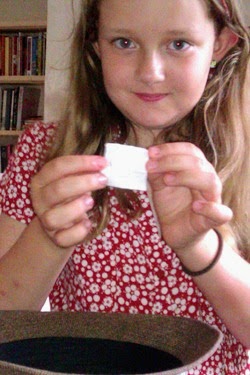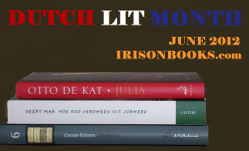
Lawrence Durrell was born on February 27th 1912 in Jalandhar , India, the eldest son (the others being Leslie, Margaret, and Gerald) of Indian-born British colonials Louisa and Lawrence Samuel Durrell. His first school was St Joseph's College, North Point, Darjeeling . On reaching the age of eleven Lawrence was sent to England, briefly attending St Olave's Grammar School , before settling at St Edmund's School , Canterbury, he failed his entrance exam to university.
His father died soon after, and Durrell with his share of the inheritance headed to Bloomsbury with the intention of becoming a writer - he had his first collection of poetry Quaint Fragment, published in 1931 at the age of 19. In January 1935 he married Nancy Isobel Myers (his first of four marriages), and by March of the same year he had convinced his wife, mother & siblings to leave England and set up home in Corfu, ostensibly to live more economically, but with the additional aim of escaping both the English weather and stultifying English culture, often referred to by Durrell as “the English death” a major factor in why he resisted affiliation with Britain, preferring to be considered a cosmopolitan writer. 1935 was also the year his first novel Pied Piper of Lovers , was published and also around this time, after reading a copy of Henry Miller 's 1934 novel Tropic of Cancer, he wrote Miller an enthusiastic letter stating his admiration for the novel and Miller replied with equal enthusiasm. It was the start of a correspondence - and a friendship - which would last 45 years, until Miller's death in 1980. His next novel was The Black Book written in 1938, a work heavily influenced by Millers writing. This mildly risqué work didn’t get published in Britain until 1973. In the story, the main character Lawrence Lucifer struggles to escape the spiritual sterility of a dying England.
Lawrence with his wife Nancy, lived a bohemian existence, first living with his family, before setting up home in the “White House”, a fisherman's cottage on the shore of Corfu's north-eastern coast at Kalami, a tiny fishing village, visited by friends such as the poet Theodore Stephanides and Henry Miller who stayed there in 1939. It was also during this period (Aug’,1937) that he & Nancy travelled to the Villa Seurat in Paris to meet Henry Miller and Anaïs Nin. Together with Alfred Perles, they began a collaboration with the ambition of creating their own literary movement, they also started the Villa Seurat Series, publishing Durrell’s Black Book, Miller's Max and the White Phagocytes, and Nin's Winter of Artifice, with Jack Kahane of the Obelisk Press on board as the publisher.
 At the outbreak of the Second world war, Durrell’s family returned to Britain, whilst Lawrence and Nancy remained on the island. In 1940 they had a daughter Penelope Berengaria, soon after this Greece fell to the Germans & they both had to escape via Crete, then on to Alexandria in Egypt. This added more stress to a relationship already under strain and in 1942 they separated with Nancy & child moving to Jerusalem.
At the outbreak of the Second world war, Durrell’s family returned to Britain, whilst Lawrence and Nancy remained on the island. In 1940 they had a daughter Penelope Berengaria, soon after this Greece fell to the Germans & they both had to escape via Crete, then on to Alexandria in Egypt. This added more stress to a relationship already under strain and in 1942 they separated with Nancy & child moving to Jerusalem.
Whilst in Egypt, Lawrence Durrell worked as a Press attaché to the British Embassies, first in Cairo and then moving on to Alexandria. It was here that he met Yvette Cohen (Eve) a native of the city and who inspired the character of Justine (Alexandria Quartet). After his divorce in 1947 he married Eve and in 1951 they had a baby girl whom they named after the ancient Greek poet Sappho.
After the war (1945), he left Egypt, to become a public relations officer for the British in Rhodes. He and Eve moved into the little gatekeeper's lodge of an old Turkish cemetery, where they set up home, this wasn’t to last long, as in 1947 they returned briefly to England before heading off to Argentina, where Durrell had been hired by the British Council as appointed director of their Institute in Córdoba (lecturing on cultural topics). Argentina wasn’t to his liking, so a year later he returned to Britain before taking a posting with the Foreign Office in Yugoslavia (Belgrade). Isolated and miserable in a country hostile to his way of life, Durrell, found life under Communism had little appeal for him and by 1952 he had left, if asked about it he enjoyed shocking people claiming that it had made him a Fascist. Also in 1952 Eve had a breakdown, needing treatment in a hospital in England. Durrell moved to Cyprus with his daughter Sappho Jane, where he bought a house. He supported his writing by first teaching English literature at the Pancyprian Gymnasium, then by public relations work for the British Gov’t, which became the basis for his book Bitter Lemons, (winner of the Duff Cooper Prize in 1957). In 1954 he became a Fellow of the Royal Society of Literature and in 1955 he and Eve separated.
August 1956, The ENOSIS movement wanted the end to British rule and for Cyprus to be returned to Greece, making him with his British Government position an obvious target for assassination, forcing him to leave Cyprus. This time (1957) he settled in Sommières, a small village in Languedoc, (where he pretty much stayed), also in 1957 he published Justine, the first part of what was to become his most famous work, the four books that make the tetrology - The Alexandria Quartet (Justine, Balthazar in 1958, Mountolive in 1958 and Clea in 1960). The book was a great hit with the critics, praised for its richness of style, the variety and vividness of its characters, its movement between the personal and the political, and its exotic locations in and around the city which Durrell portrays as the chief protagonist: "... the city which used us as its flora – precipitated in us conflicts which were hers and which we mistook for our own: beloved Alexandria!" The Times Literary Supplement review of the tetralogy stated: "If ever a work bore an instantly recognizable signature on every sentence, this is it." There was some suggestion that Durrell might be nominated for the Nobel Prize in Literature, although this was not to materialize.
In 1961 Lawrence married again, this time to Claude-Marie Vincendon, although she was from Alexandria they actually met on Cyprus. Now ensconced in the small village where he had purchased a large house, standing secluded in its own extensive walled grounds on the edge of the village, he started writing The Revolt of Aphrodite, comprising Tunc (1968) and Nunquam (1970), he also lost his wife to cancer (1967) which left him devastated. In 1973 he entered into his fourth and final marriage to Ghislaine de Boysson, this marriage lasted 6 years with them divorcing in 1979. During this period he wrote The Avignon Quintet, a five-volume series of novels (Monsieur, Livia, Constance, Sebastian and Quinx ) published between 1974 and 1985, which revisited several of the themes and motifs of the Quartet and Although it is frequently described as a quintet, Durrell himself referred to it as a "quincunx". Monsieur,, received the 1974 James Tait Black Memorial Prize and Constance was nominated for the 1982  Booker Prize .
Booker Prize .
Lawrence Durrell had long suffered from emphysema and in 1990 he died of a stroke at his house in Sommières.
Major works
Novels
Cefalu
White Eagles Over Serbia
The Alexandria Quartet (Justine, Balthazar, Mountolive, Clea)
The Revolt of Aphrodite (Tunc, Nunquam )
The Avignon Quintet (Monsieur: or, The Prince of Darkness, Livia: or, Buried Alive ,Constance: or, Solitary Practices, Sebastian: or, Ruling Passions, Quinx: or, The Ripper's Tale
Travel
Prospero's Cell: A guide to the landscape and manners of the island of Corcyra[Corfu] (1945; republished 2000)Reflections on a Marine Venus (1953)
Bitter Lemons (1957; republished as Bitter Lemons of Cyprus 2001)
Blue Thirst (1975)
Sicilian Carousel (1977)
The Greek Islands (1978)
Caesar's Vast Ghost (1990)
Poetry
Quaint Fragments (1931)
Ten Poems (1932)
Transition: Poems (1934)
A Private Country (1943)
Cities, Plains and People (1946)
On Seeming to Presume (1948)
Selected Poems: 1953–1963 Edited by Alan Ross (1964)
The Ikons (1966)
The Suchness of the Old Boy (1972)
Collected Poems: 1931–1974 Edited by James A. Brigham (1980)
Selected Poems of Lawrence Durrell Edited by Peter Porter (2006)
Drama
Bromo Bombastes, under the pseudonym Gaffer Peeslake (1933)
Sappho: A Play in Verse (1950)
An Irish Faustus: A Morality in Nine Scenes (1963)
Acte (1964)
Humour
Esprit de Corps (1957)
Stiff Upper Lip (1958)
Sauve Qui Peut (1966)
Antrobus Complete (1985), a collection of short stories, previously published in various magazines, about life in the diplomatic corps.
Letters & Essays
A Key to Modern British Poetry (1952)
Lawrence Durrell and Henry Miller: A Private Correspondence (1962) edited by George Wickes
Spirit of Place: Letters and Essays on Travel (1969) edited by Alan G. Thomas
Literary Lifelines: The Richard Aldington—Lawrence Durrell Correspondence (1981) edited by Ian S. MacNiven and Harry T. Moore
A Smile in the Mind's Eye (1982)
"Letters to T. S. Eliot." (1987) Twentieth Century Literature vol. 33 no. 3 pp. 348–358.
The Durrell-Miller Letters: 1935–80 (1988) edited by Ian S. MacNiven
Letters to Jean Fanchette (1988) edited by Jean Fanchette
Editing and translating
Wordsworth; Selected by Lawrence Durrell (1973) edited by Durrell
New Poems 1963: A P.E.N. Anthology of Contemporary Poetry (1963) edited by Durrell
The Best of Henry Miller (1960) edited by Durrell
The Curious History of Pope Joan (1954) by Emmanuel Roídes, translated by Durrell
The King of Asine and Other Poems (1948) by George Seferis, translated by Durrell, Bernard Spencer, and Nanos Valaoritis
Six Poems From the Greek of Sikelianós and Seféris (1946) translated by Durrell

The International Lawrence Durrell Society
The Lawrence Durrell Centenary Paris Review ( Interview)
Invention of Spring( An Introduction) Guardian Podcast(Lawrence Durrell at 100)
Faber & Faber (Lawrence Durrell)
















